Literature Review: Leadership's Impact on Organizational Performance
VerifiedAdded on 2022/11/18
|7
|1744
|306
Report
AI Summary
This literature review synthesizes research on leadership in business and organizational performance, drawing from multiple studies to explore the influence of different leadership styles on various organizational outcomes. The review examines the impact of transformational leadership, organizational learning, and intellectual capital on employee performance, organizational growth, and financial success. Key findings highlight the importance of behaviors like integrity, trust, and the development of employee skills. The studies discussed, conducted across different sectors and geographical locations, underscore the significance of leadership in fostering a positive organizational climate and achieving high performance. The review also discusses the level 5 leadership model and practical management techniques, providing a comprehensive overview of the latest insights into effective leadership.
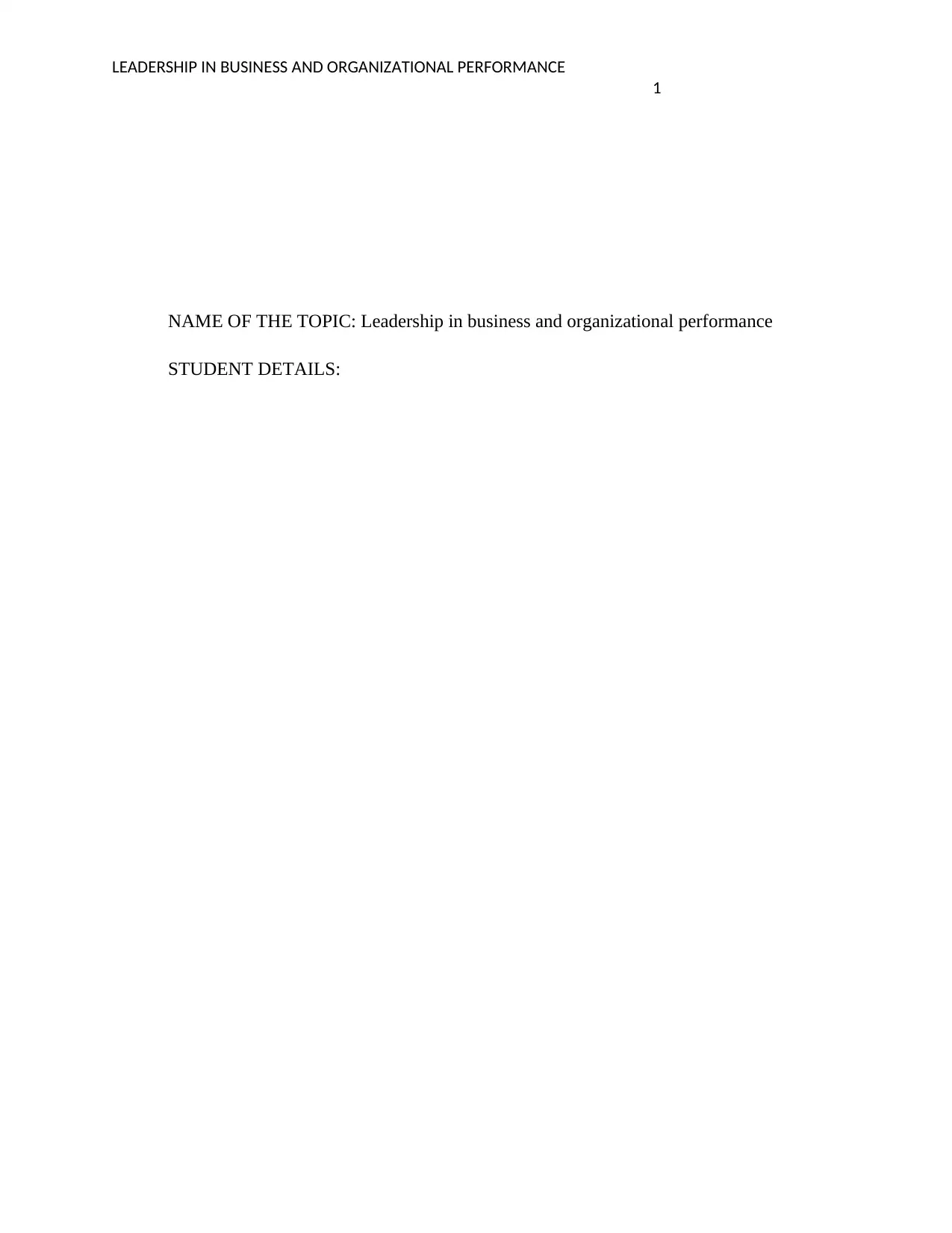
LEADERSHIP IN BUSINESS AND ORGANIZATIONAL PERFORMANCE
1
NAME OF THE TOPIC: Leadership in business and organizational performance
STUDENT DETAILS:
1
NAME OF THE TOPIC: Leadership in business and organizational performance
STUDENT DETAILS:
Paraphrase This Document
Need a fresh take? Get an instant paraphrase of this document with our AI Paraphraser
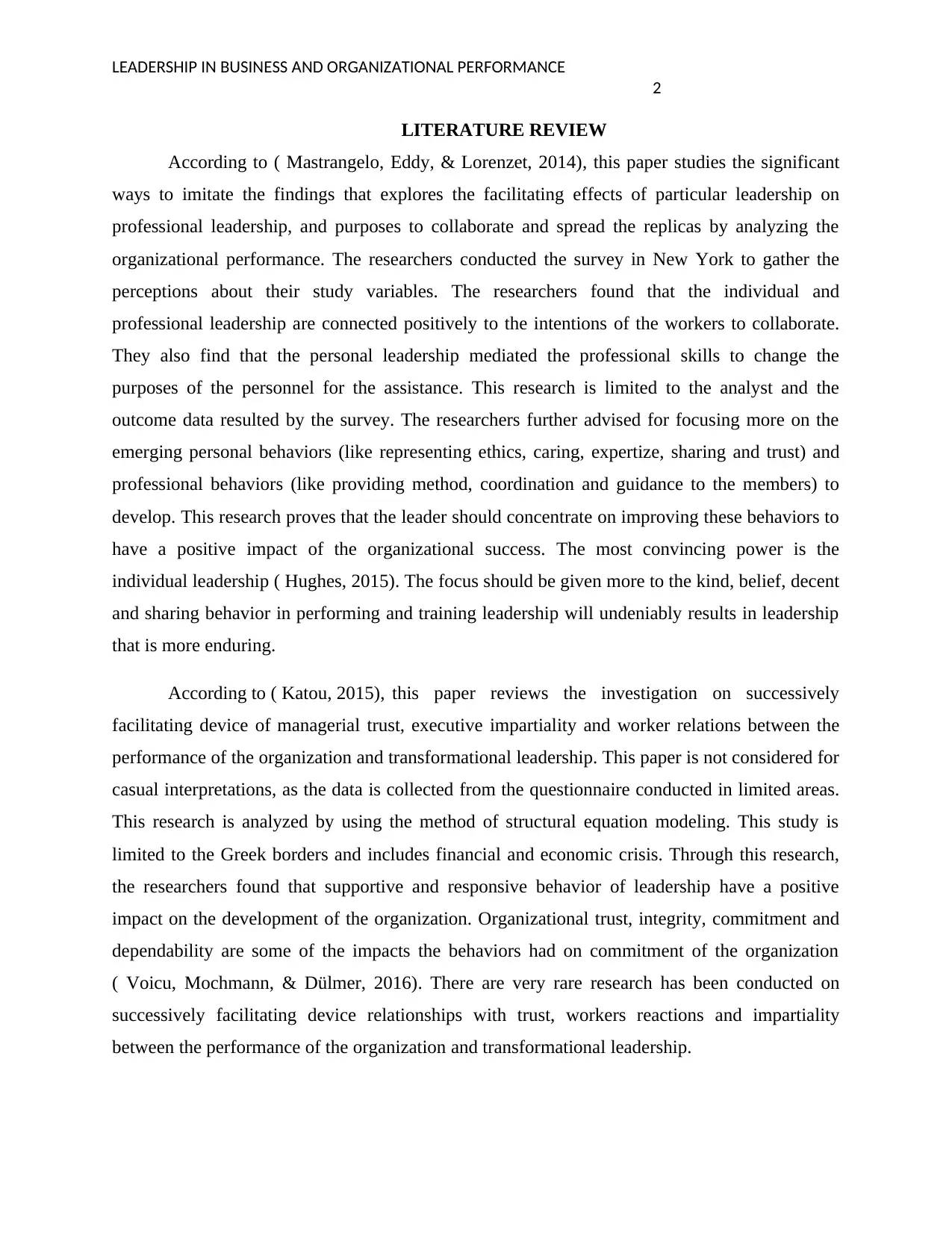
LEADERSHIP IN BUSINESS AND ORGANIZATIONAL PERFORMANCE
2
LITERATURE REVIEW
According to ( Mastrangelo, Eddy, & Lorenzet, 2014), this paper studies the significant
ways to imitate the findings that explores the facilitating effects of particular leadership on
professional leadership, and purposes to collaborate and spread the replicas by analyzing the
organizational performance. The researchers conducted the survey in New York to gather the
perceptions about their study variables. The researchers found that the individual and
professional leadership are connected positively to the intentions of the workers to collaborate.
They also find that the personal leadership mediated the professional skills to change the
purposes of the personnel for the assistance. This research is limited to the analyst and the
outcome data resulted by the survey. The researchers further advised for focusing more on the
emerging personal behaviors (like representing ethics, caring, expertize, sharing and trust) and
professional behaviors (like providing method, coordination and guidance to the members) to
develop. This research proves that the leader should concentrate on improving these behaviors to
have a positive impact of the organizational success. The most convincing power is the
individual leadership ( Hughes, 2015). The focus should be given more to the kind, belief, decent
and sharing behavior in performing and training leadership will undeniably results in leadership
that is more enduring.
According to ( Katou, 2015), this paper reviews the investigation on successively
facilitating device of managerial trust, executive impartiality and worker relations between the
performance of the organization and transformational leadership. This paper is not considered for
casual interpretations, as the data is collected from the questionnaire conducted in limited areas.
This research is analyzed by using the method of structural equation modeling. This study is
limited to the Greek borders and includes financial and economic crisis. Through this research,
the researchers found that supportive and responsive behavior of leadership have a positive
impact on the development of the organization. Organizational trust, integrity, commitment and
dependability are some of the impacts the behaviors had on commitment of the organization
( Voicu, Mochmann, & Dülmer, 2016). There are very rare research has been conducted on
successively facilitating device relationships with trust, workers reactions and impartiality
between the performance of the organization and transformational leadership.
2
LITERATURE REVIEW
According to ( Mastrangelo, Eddy, & Lorenzet, 2014), this paper studies the significant
ways to imitate the findings that explores the facilitating effects of particular leadership on
professional leadership, and purposes to collaborate and spread the replicas by analyzing the
organizational performance. The researchers conducted the survey in New York to gather the
perceptions about their study variables. The researchers found that the individual and
professional leadership are connected positively to the intentions of the workers to collaborate.
They also find that the personal leadership mediated the professional skills to change the
purposes of the personnel for the assistance. This research is limited to the analyst and the
outcome data resulted by the survey. The researchers further advised for focusing more on the
emerging personal behaviors (like representing ethics, caring, expertize, sharing and trust) and
professional behaviors (like providing method, coordination and guidance to the members) to
develop. This research proves that the leader should concentrate on improving these behaviors to
have a positive impact of the organizational success. The most convincing power is the
individual leadership ( Hughes, 2015). The focus should be given more to the kind, belief, decent
and sharing behavior in performing and training leadership will undeniably results in leadership
that is more enduring.
According to ( Katou, 2015), this paper reviews the investigation on successively
facilitating device of managerial trust, executive impartiality and worker relations between the
performance of the organization and transformational leadership. This paper is not considered for
casual interpretations, as the data is collected from the questionnaire conducted in limited areas.
This research is analyzed by using the method of structural equation modeling. This study is
limited to the Greek borders and includes financial and economic crisis. Through this research,
the researchers found that supportive and responsive behavior of leadership have a positive
impact on the development of the organization. Organizational trust, integrity, commitment and
dependability are some of the impacts the behaviors had on commitment of the organization
( Voicu, Mochmann, & Dülmer, 2016). There are very rare research has been conducted on
successively facilitating device relationships with trust, workers reactions and impartiality
between the performance of the organization and transformational leadership.
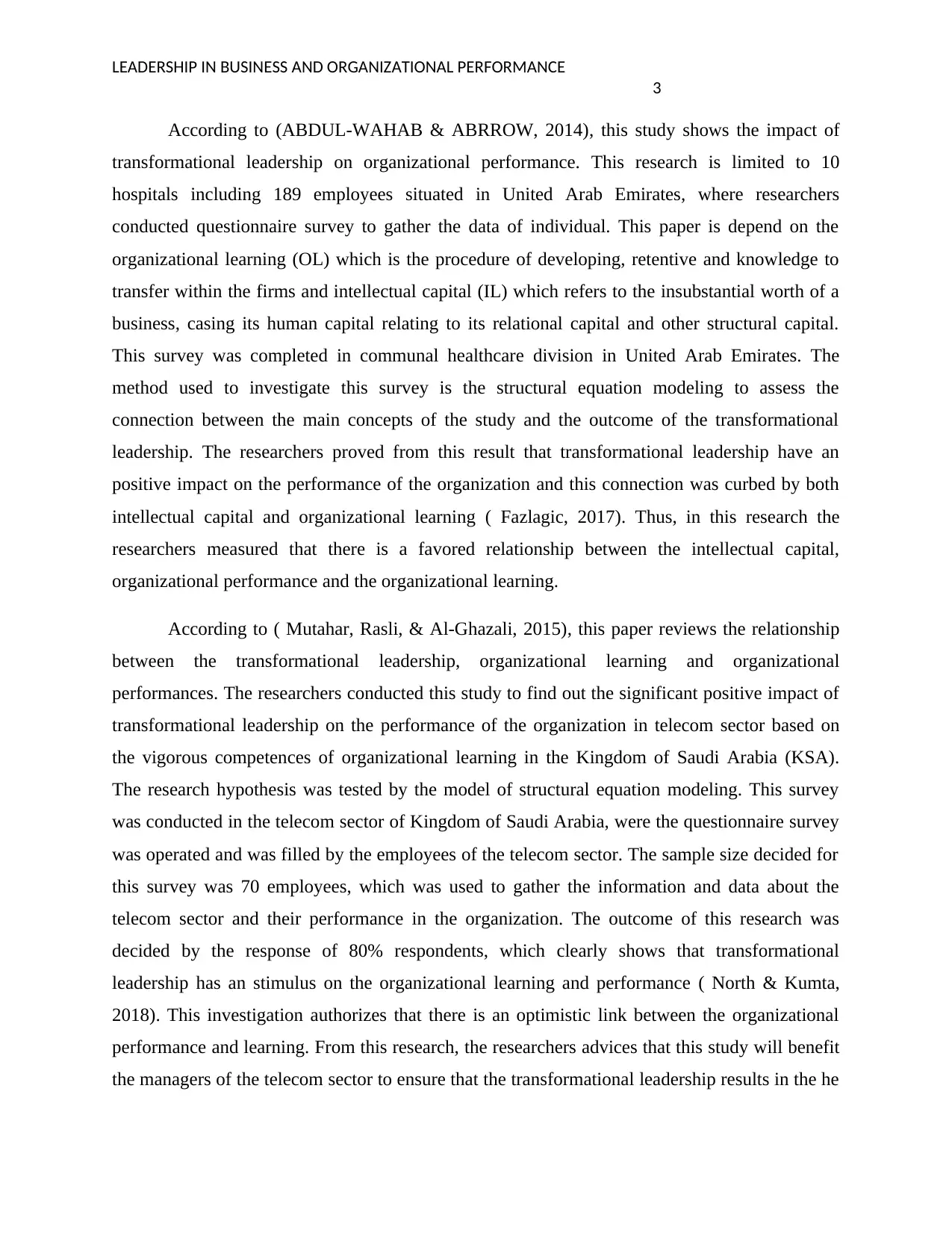
LEADERSHIP IN BUSINESS AND ORGANIZATIONAL PERFORMANCE
3
According to (ABDUL-WAHAB & ABRROW, 2014), this study shows the impact of
transformational leadership on organizational performance. This research is limited to 10
hospitals including 189 employees situated in United Arab Emirates, where researchers
conducted questionnaire survey to gather the data of individual. This paper is depend on the
organizational learning (OL) which is the procedure of developing, retentive and knowledge to
transfer within the firms and intellectual capital (IL) which refers to the insubstantial worth of a
business, casing its human capital relating to its relational capital and other structural capital.
This survey was completed in communal healthcare division in United Arab Emirates. The
method used to investigate this survey is the structural equation modeling to assess the
connection between the main concepts of the study and the outcome of the transformational
leadership. The researchers proved from this result that transformational leadership have an
positive impact on the performance of the organization and this connection was curbed by both
intellectual capital and organizational learning ( Fazlagic, 2017). Thus, in this research the
researchers measured that there is a favored relationship between the intellectual capital,
organizational performance and the organizational learning.
According to ( Mutahar, Rasli, & Al-Ghazali, 2015), this paper reviews the relationship
between the transformational leadership, organizational learning and organizational
performances. The researchers conducted this study to find out the significant positive impact of
transformational leadership on the performance of the organization in telecom sector based on
the vigorous competences of organizational learning in the Kingdom of Saudi Arabia (KSA).
The research hypothesis was tested by the model of structural equation modeling. This survey
was conducted in the telecom sector of Kingdom of Saudi Arabia, were the questionnaire survey
was operated and was filled by the employees of the telecom sector. The sample size decided for
this survey was 70 employees, which was used to gather the information and data about the
telecom sector and their performance in the organization. The outcome of this research was
decided by the response of 80% respondents, which clearly shows that transformational
leadership has an stimulus on the organizational learning and performance ( North & Kumta,
2018). This investigation authorizes that there is an optimistic link between the organizational
performance and learning. From this research, the researchers advices that this study will benefit
the managers of the telecom sector to ensure that the transformational leadership results in the he
3
According to (ABDUL-WAHAB & ABRROW, 2014), this study shows the impact of
transformational leadership on organizational performance. This research is limited to 10
hospitals including 189 employees situated in United Arab Emirates, where researchers
conducted questionnaire survey to gather the data of individual. This paper is depend on the
organizational learning (OL) which is the procedure of developing, retentive and knowledge to
transfer within the firms and intellectual capital (IL) which refers to the insubstantial worth of a
business, casing its human capital relating to its relational capital and other structural capital.
This survey was completed in communal healthcare division in United Arab Emirates. The
method used to investigate this survey is the structural equation modeling to assess the
connection between the main concepts of the study and the outcome of the transformational
leadership. The researchers proved from this result that transformational leadership have an
positive impact on the performance of the organization and this connection was curbed by both
intellectual capital and organizational learning ( Fazlagic, 2017). Thus, in this research the
researchers measured that there is a favored relationship between the intellectual capital,
organizational performance and the organizational learning.
According to ( Mutahar, Rasli, & Al-Ghazali, 2015), this paper reviews the relationship
between the transformational leadership, organizational learning and organizational
performances. The researchers conducted this study to find out the significant positive impact of
transformational leadership on the performance of the organization in telecom sector based on
the vigorous competences of organizational learning in the Kingdom of Saudi Arabia (KSA).
The research hypothesis was tested by the model of structural equation modeling. This survey
was conducted in the telecom sector of Kingdom of Saudi Arabia, were the questionnaire survey
was operated and was filled by the employees of the telecom sector. The sample size decided for
this survey was 70 employees, which was used to gather the information and data about the
telecom sector and their performance in the organization. The outcome of this research was
decided by the response of 80% respondents, which clearly shows that transformational
leadership has an stimulus on the organizational learning and performance ( North & Kumta,
2018). This investigation authorizes that there is an optimistic link between the organizational
performance and learning. From this research, the researchers advices that this study will benefit
the managers of the telecom sector to ensure that the transformational leadership results in the he
⊘ This is a preview!⊘
Do you want full access?
Subscribe today to unlock all pages.

Trusted by 1+ million students worldwide
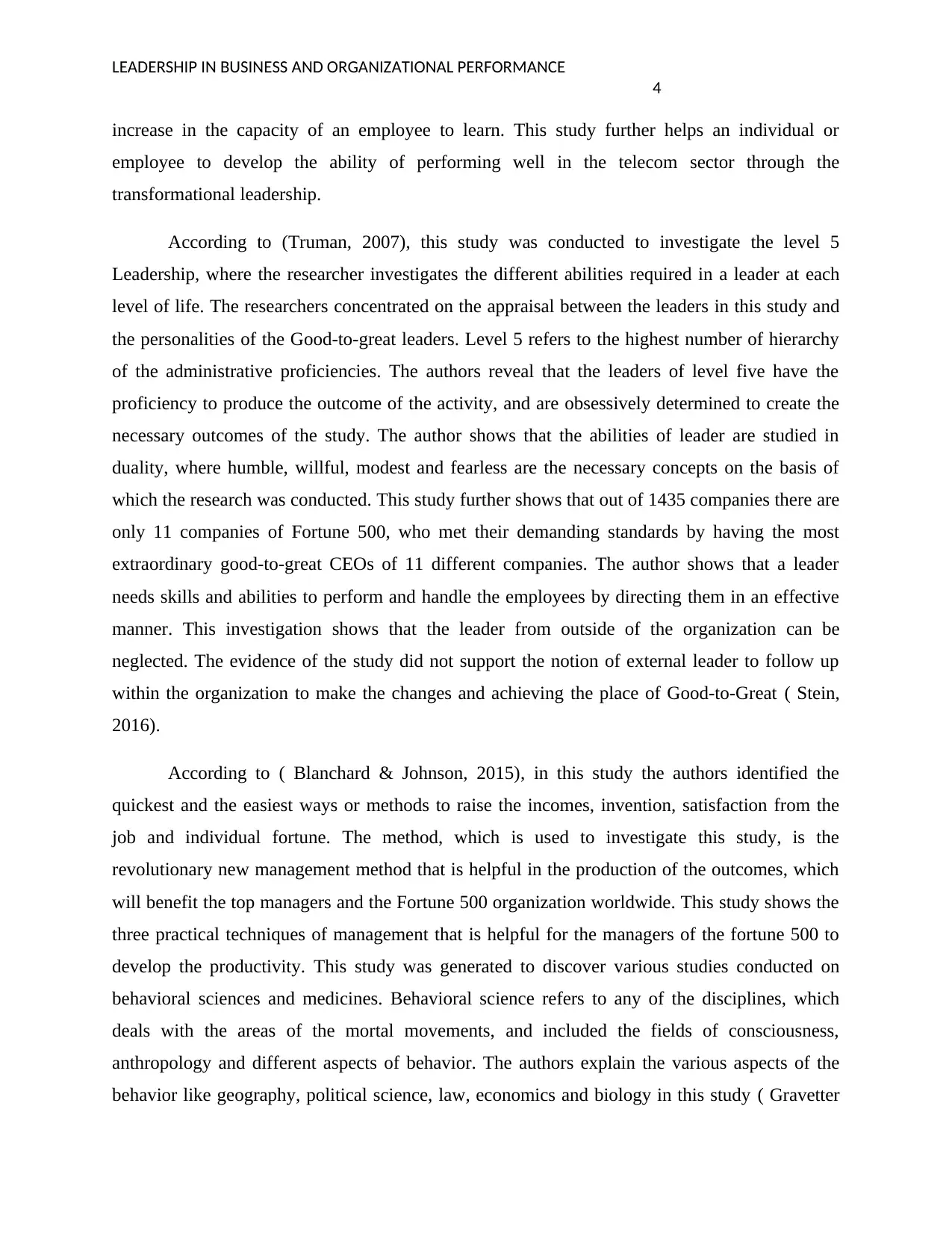
LEADERSHIP IN BUSINESS AND ORGANIZATIONAL PERFORMANCE
4
increase in the capacity of an employee to learn. This study further helps an individual or
employee to develop the ability of performing well in the telecom sector through the
transformational leadership.
According to (Truman, 2007), this study was conducted to investigate the level 5
Leadership, where the researcher investigates the different abilities required in a leader at each
level of life. The researchers concentrated on the appraisal between the leaders in this study and
the personalities of the Good-to-great leaders. Level 5 refers to the highest number of hierarchy
of the administrative proficiencies. The authors reveal that the leaders of level five have the
proficiency to produce the outcome of the activity, and are obsessively determined to create the
necessary outcomes of the study. The author shows that the abilities of leader are studied in
duality, where humble, willful, modest and fearless are the necessary concepts on the basis of
which the research was conducted. This study further shows that out of 1435 companies there are
only 11 companies of Fortune 500, who met their demanding standards by having the most
extraordinary good-to-great CEOs of 11 different companies. The author shows that a leader
needs skills and abilities to perform and handle the employees by directing them in an effective
manner. This investigation shows that the leader from outside of the organization can be
neglected. The evidence of the study did not support the notion of external leader to follow up
within the organization to make the changes and achieving the place of Good-to-Great ( Stein,
2016).
According to ( Blanchard & Johnson, 2015), in this study the authors identified the
quickest and the easiest ways or methods to raise the incomes, invention, satisfaction from the
job and individual fortune. The method, which is used to investigate this study, is the
revolutionary new management method that is helpful in the production of the outcomes, which
will benefit the top managers and the Fortune 500 organization worldwide. This study shows the
three practical techniques of management that is helpful for the managers of the fortune 500 to
develop the productivity. This study was generated to discover various studies conducted on
behavioral sciences and medicines. Behavioral science refers to any of the disciplines, which
deals with the areas of the mortal movements, and included the fields of consciousness,
anthropology and different aspects of behavior. The authors explain the various aspects of the
behavior like geography, political science, law, economics and biology in this study ( Gravetter
4
increase in the capacity of an employee to learn. This study further helps an individual or
employee to develop the ability of performing well in the telecom sector through the
transformational leadership.
According to (Truman, 2007), this study was conducted to investigate the level 5
Leadership, where the researcher investigates the different abilities required in a leader at each
level of life. The researchers concentrated on the appraisal between the leaders in this study and
the personalities of the Good-to-great leaders. Level 5 refers to the highest number of hierarchy
of the administrative proficiencies. The authors reveal that the leaders of level five have the
proficiency to produce the outcome of the activity, and are obsessively determined to create the
necessary outcomes of the study. The author shows that the abilities of leader are studied in
duality, where humble, willful, modest and fearless are the necessary concepts on the basis of
which the research was conducted. This study further shows that out of 1435 companies there are
only 11 companies of Fortune 500, who met their demanding standards by having the most
extraordinary good-to-great CEOs of 11 different companies. The author shows that a leader
needs skills and abilities to perform and handle the employees by directing them in an effective
manner. This investigation shows that the leader from outside of the organization can be
neglected. The evidence of the study did not support the notion of external leader to follow up
within the organization to make the changes and achieving the place of Good-to-Great ( Stein,
2016).
According to ( Blanchard & Johnson, 2015), in this study the authors identified the
quickest and the easiest ways or methods to raise the incomes, invention, satisfaction from the
job and individual fortune. The method, which is used to investigate this study, is the
revolutionary new management method that is helpful in the production of the outcomes, which
will benefit the top managers and the Fortune 500 organization worldwide. This study shows the
three practical techniques of management that is helpful for the managers of the fortune 500 to
develop the productivity. This study was generated to discover various studies conducted on
behavioral sciences and medicines. Behavioral science refers to any of the disciplines, which
deals with the areas of the mortal movements, and included the fields of consciousness,
anthropology and different aspects of behavior. The authors explain the various aspects of the
behavior like geography, political science, law, economics and biology in this study ( Gravetter
Paraphrase This Document
Need a fresh take? Get an instant paraphrase of this document with our AI Paraphraser
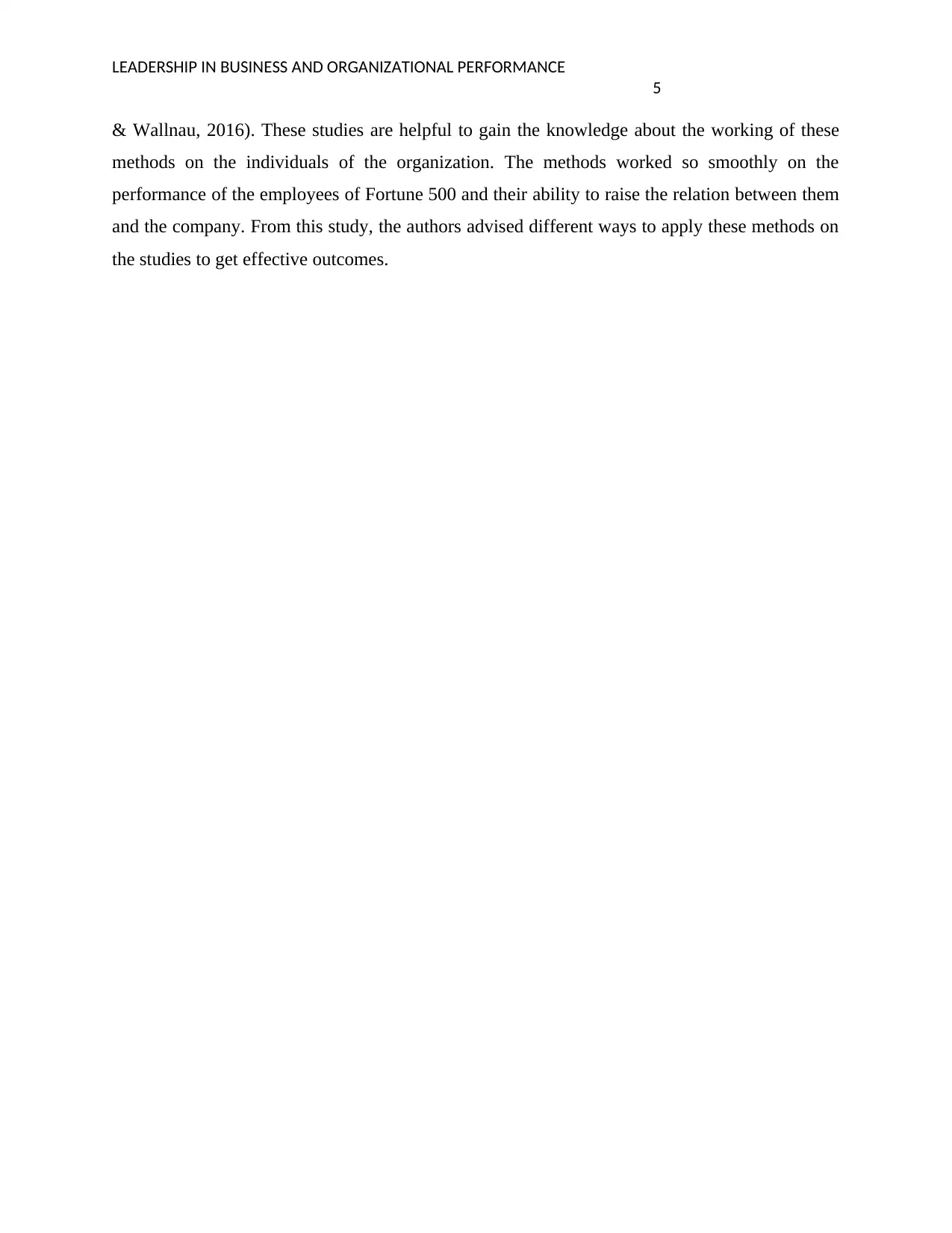
LEADERSHIP IN BUSINESS AND ORGANIZATIONAL PERFORMANCE
5
& Wallnau, 2016). These studies are helpful to gain the knowledge about the working of these
methods on the individuals of the organization. The methods worked so smoothly on the
performance of the employees of Fortune 500 and their ability to raise the relation between them
and the company. From this study, the authors advised different ways to apply these methods on
the studies to get effective outcomes.
5
& Wallnau, 2016). These studies are helpful to gain the knowledge about the working of these
methods on the individuals of the organization. The methods worked so smoothly on the
performance of the employees of Fortune 500 and their ability to raise the relation between them
and the company. From this study, the authors advised different ways to apply these methods on
the studies to get effective outcomes.
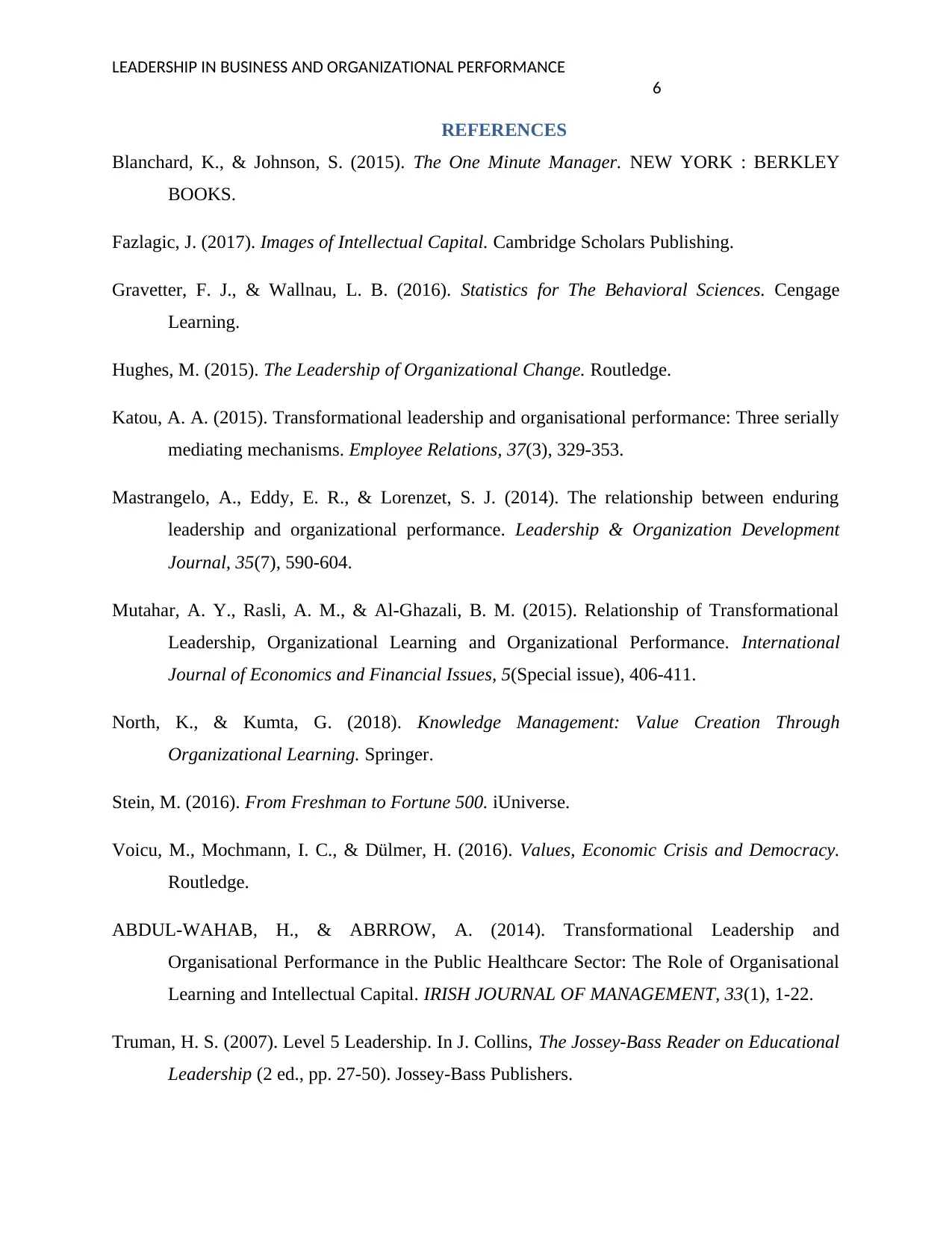
LEADERSHIP IN BUSINESS AND ORGANIZATIONAL PERFORMANCE
6
REFERENCES
Blanchard, K., & Johnson, S. (2015). The One Minute Manager. NEW YORK : BERKLEY
BOOKS.
Fazlagic, J. (2017). Images of Intellectual Capital. Cambridge Scholars Publishing.
Gravetter, F. J., & Wallnau, L. B. (2016). Statistics for The Behavioral Sciences. Cengage
Learning.
Hughes, M. (2015). The Leadership of Organizational Change. Routledge.
Katou, A. A. (2015). Transformational leadership and organisational performance: Three serially
mediating mechanisms. Employee Relations, 37(3), 329-353.
Mastrangelo, A., Eddy, E. R., & Lorenzet, S. J. (2014). The relationship between enduring
leadership and organizational performance. Leadership & Organization Development
Journal, 35(7), 590-604.
Mutahar, A. Y., Rasli, A. M., & Al-Ghazali, B. M. (2015). Relationship of Transformational
Leadership, Organizational Learning and Organizational Performance. International
Journal of Economics and Financial Issues, 5(Special issue), 406-411.
North, K., & Kumta, G. (2018). Knowledge Management: Value Creation Through
Organizational Learning. Springer.
Stein, M. (2016). From Freshman to Fortune 500. iUniverse.
Voicu, M., Mochmann, I. C., & Dülmer, H. (2016). Values, Economic Crisis and Democracy.
Routledge.
ABDUL-WAHAB, H., & ABRROW, A. (2014). Transformational Leadership and
Organisational Performance in the Public Healthcare Sector: The Role of Organisational
Learning and Intellectual Capital. IRISH JOURNAL OF MANAGEMENT, 33(1), 1-22.
Truman, H. S. (2007). Level 5 Leadership. In J. Collins, The Jossey-Bass Reader on Educational
Leadership (2 ed., pp. 27-50). Jossey-Bass Publishers.
6
REFERENCES
Blanchard, K., & Johnson, S. (2015). The One Minute Manager. NEW YORK : BERKLEY
BOOKS.
Fazlagic, J. (2017). Images of Intellectual Capital. Cambridge Scholars Publishing.
Gravetter, F. J., & Wallnau, L. B. (2016). Statistics for The Behavioral Sciences. Cengage
Learning.
Hughes, M. (2015). The Leadership of Organizational Change. Routledge.
Katou, A. A. (2015). Transformational leadership and organisational performance: Three serially
mediating mechanisms. Employee Relations, 37(3), 329-353.
Mastrangelo, A., Eddy, E. R., & Lorenzet, S. J. (2014). The relationship between enduring
leadership and organizational performance. Leadership & Organization Development
Journal, 35(7), 590-604.
Mutahar, A. Y., Rasli, A. M., & Al-Ghazali, B. M. (2015). Relationship of Transformational
Leadership, Organizational Learning and Organizational Performance. International
Journal of Economics and Financial Issues, 5(Special issue), 406-411.
North, K., & Kumta, G. (2018). Knowledge Management: Value Creation Through
Organizational Learning. Springer.
Stein, M. (2016). From Freshman to Fortune 500. iUniverse.
Voicu, M., Mochmann, I. C., & Dülmer, H. (2016). Values, Economic Crisis and Democracy.
Routledge.
ABDUL-WAHAB, H., & ABRROW, A. (2014). Transformational Leadership and
Organisational Performance in the Public Healthcare Sector: The Role of Organisational
Learning and Intellectual Capital. IRISH JOURNAL OF MANAGEMENT, 33(1), 1-22.
Truman, H. S. (2007). Level 5 Leadership. In J. Collins, The Jossey-Bass Reader on Educational
Leadership (2 ed., pp. 27-50). Jossey-Bass Publishers.
⊘ This is a preview!⊘
Do you want full access?
Subscribe today to unlock all pages.

Trusted by 1+ million students worldwide

LEADERSHIP IN BUSINESS AND ORGANIZATIONAL PERFORMANCE
7
7
1 out of 7
Related Documents
Your All-in-One AI-Powered Toolkit for Academic Success.
+13062052269
info@desklib.com
Available 24*7 on WhatsApp / Email
![[object Object]](/_next/static/media/star-bottom.7253800d.svg)
Unlock your academic potential
Copyright © 2020–2026 A2Z Services. All Rights Reserved. Developed and managed by ZUCOL.




